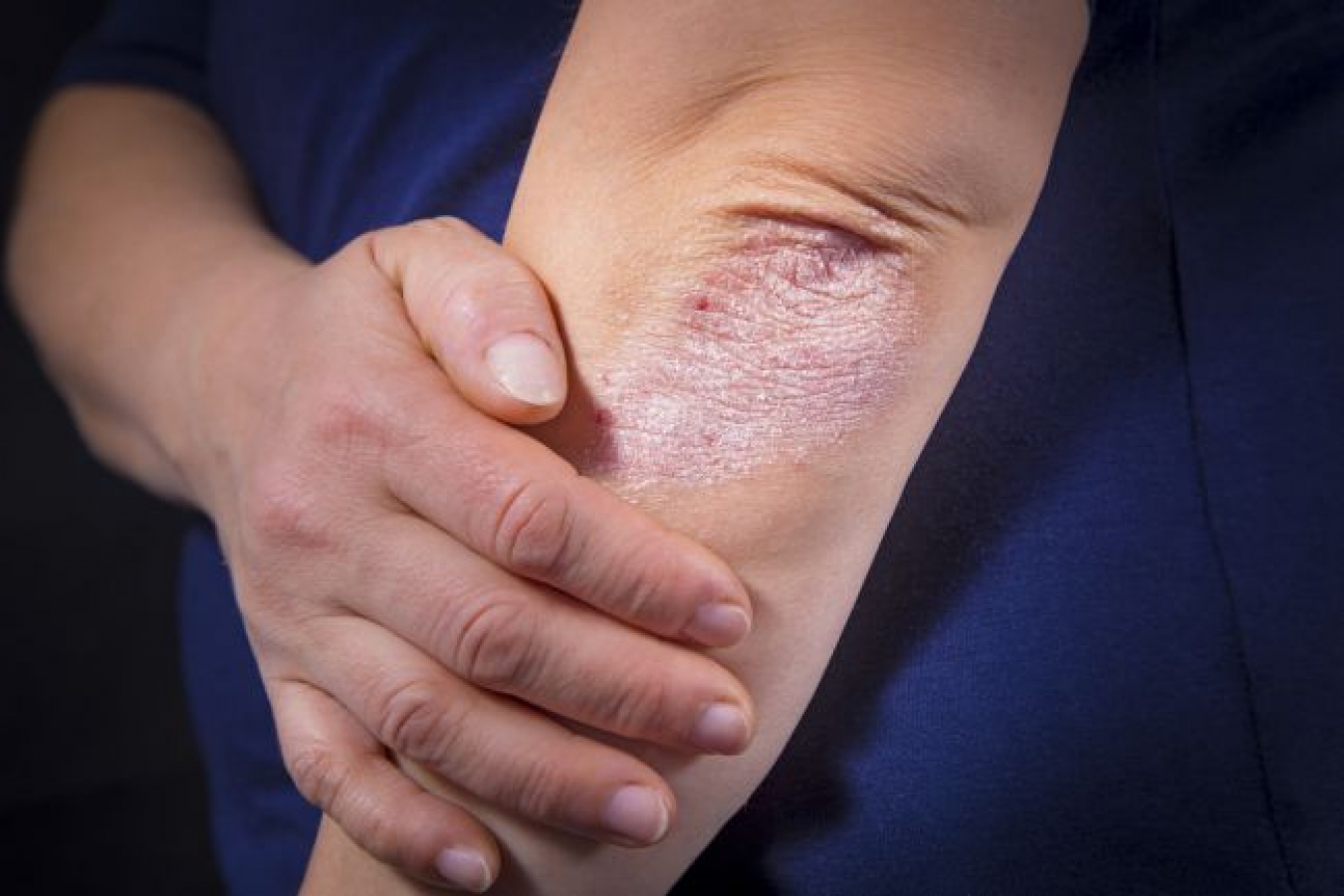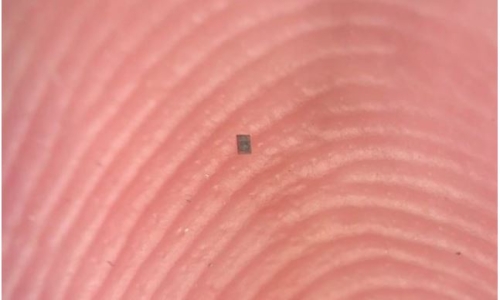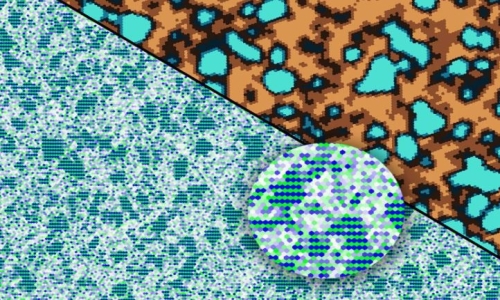


 7:19:32
7:19:32  2019-09-02
2019-09-02  1107
1107

Psoriasis is a disease that causes people to develop thick patches of inflamed skin covered with silvery scales. It's an autoimmune disease, meaning that the immune system becomes overactive and attacks healthy cells in the body by mistake.
With psoriasis, an overactive immune system leads to skin cells that grow too quickly: New skin cells form in days rather than weeks, which causes them to build up rapidly on the surface of the skin, forming the characteristic thick patches and scales of psoriasis, according to the National Psoriasis Foundation.
In people with light-colored skin, psoriasis looks like salmon-pink plaque with an overlying whitish scale, said Dr. David Rosmarin, a dermatologist at Tufts Medical Center in Boston. The most common locations affected are the elbows, knees, scalp, lower back and backside, and the genitals may also be affected, he said.
On people with dark-colored skin, those skin patches look more violet or purplish, with a gray scale, according to the American Academy of Dermatology.
About 7.5 million people in the U.S. have psoriasis. The most common type is plaque psoriasis, which affects about 80% of people, according to the American Academy of Dermatology.
Plaque psoriasis is one of the five types of psoriasis that affects adults and children. (The other four types are guttate, pustular, inverse and erythrodermic.) It's possible to have more than one type of psoriasis at the same time, Rosmarin said. [5 Ways Skin Can Signal Health Problems]
What does psoriasis look like?
Itchiness is the most common complaint in people with psoriasis, Rosmarin told Live Science. People feel itchy especially when psoriasis affects their scalp, palms of the hands or soles of their feet, he said.
According to the Mayo Clinic, the most common physical symptoms of plaque psoriasis include:
The skin disease may also take a psychological toll, as evidenced by higher rates of depression, anxiety and substance abuse found in people with psoriasis, Rosmarin said.
Psoriasis can show up anywhere on the skin, and the patches can appear separately or join together to cover a larger area. When patches and scales are in visible locations, people with psoriasis may feel self-conscious or withdraw socially.
"Some of my patients with psoriasis won't go out with shorts or short-sleeved shirts in the summer," Rosmarin said. Similarly, some of Rosmarin's patients with scalp psoriasis refuse to wear black shirts because they're worried about the visible dandruff from their shedding scales, he said.
Causes, risk factors and triggers
It's unclear what causes psoriasis, but an immune system that is too active as well as genetic and environmental factors may be responsible, Rosmarin said. People with a family history of psoriasis and those who have had viral or bacterial infections, such as strep or skin infections, are more likely to develop psoriasis, he said. But psoriasis is not contagious, so a person can't get it by touching the skin patches of someone who has it.
Another theory is that psoriasis may be spurred by a traumatic injury to the skin, such as burns, animal bites or tattoos, Rosmarin said.
The following factors may trigger flare-ups of psoriasis, making the condition worse for a few weeks or months, according to the National Psoriasis Foundation.
Diagnosis and treatment
A dermatologist will examine a person's skin, nails and scalp for signs of psoriasis, as well as ask whether any family members have the disease. If psoriasis is suspected, a small sample of affected skin (biopsy) may be removed and viewed under a microscope: Skin with psoriasis looks thicker and inflamed compared with skin with eczema, for example.
Psoriasis can develop at any age. People are typically diagnosed in their 20s, but there is a smaller peak period later in life between ages 50 and 60, Rosmarin said.
With the current advancement in treatment methods, dermatologists can help the vast majority of patients with psoriasis much more than they could have just a decade ago, Rosmarin told Live Science.
There are four categories of treatment available to people with psoriasis: Topical creams and ointments; phototherapy (exposure to ultraviolet light); oral medications; and biologics, which are drugs given by injection (shots) or intravenously, Rosmarin said. The treatment a person with psoriasis receives depends on the severity of their case and their overall health.
Arthritis and other health effects
Although psoriasis is a skin disease, it can influence a person's health in a number of different ways. For example, some people with psoriasis have an increased risk of developing psoriatic arthritis, an inflammatory form of arthritis. About one-third of people with psoriasis get this type of arthritis, which causes joint pain and stiffness, Rosmarin said. Without treatment, psoriatic arthritis can cause structural damage to the affected joints, he said.
People with moderate to severe forms of psoriasis are also at a higher risk of cardiovascular disease, such as heart attack and stroke, Rosmarin said. This might be because psoriasis triggers long-lasting inflammation in the body that can affect the skin and joints and may also affect the heart and blood vessels, he said.
Reality Of Islam |
|

A tiny robo

By applying

Stanford, C
 9:3:43
9:3:43
 2018-11-05
2018-11-05
10 benefits of Marriage in Islam
 7:5:22
7:5:22
 2019-04-08
2019-04-08
benefits of reciting surat yunus, hud &
 9:45:7
9:45:7
 2018-12-24
2018-12-24
advantages & disadvantages of divorce
 11:35:12
11:35:12
 2018-06-10
2018-06-10
 6:0:51
6:0:51
 2018-10-16
2018-10-16
 6:14:3
6:14:3
 2023-01-18
2023-01-18
 3:43:50
3:43:50
 2022-11-05
2022-11-05
 7:32:24
7:32:24
 2022-02-14
2022-02-14
 8:15:37
8:15:37
 2023-02-16
2023-02-16
 8:21:9
8:21:9
 2018-06-21
2018-06-21
 2:11:12
2:11:12
 2022-10-15
2022-10-15
 4:26:43
4:26:43
 2022-02-21
2022-02-21
 5:41:46
5:41:46
 2023-03-18
2023-03-18
| LATEST |